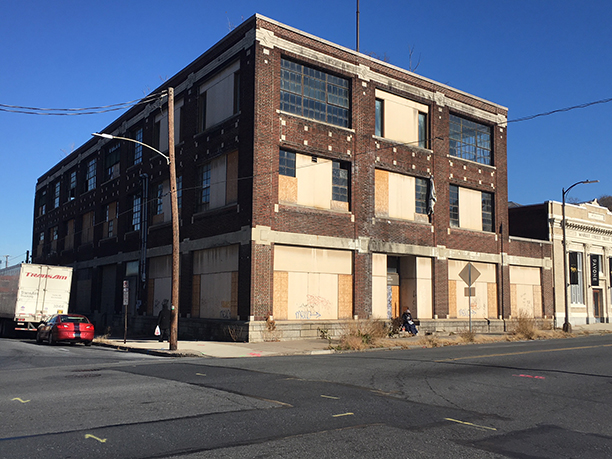Another piece of Harrisburg’s industrial past is set to disappear, as the century-old building at 10th and Market streets will meet the wrecking ball next week.
On Monday, the Pennsylvania Housing Finance Agency (PHFA) plans to begin demolition of the so-called Schell building at 1000 Market St., a long-blighted, vacant industrial structure.
“The building has been deteriorating,” said Brian Hudson, PHFA’s CEO and executive director. “The brick started to deteriorate, and there were health and safety concerns.”
The three-story, 28,000-square-foot building was originally constructed in 1916 as the Standard Baking Co., founded by the Graupner family, whose flagship brewery was located directly across the street. In 1920, it became the Schell Quality Seed Store after Walter S. Schell moved his quickly growing seed distribution and retailing business to that location from farther up Market Street.
The store, which also sold gardening supplies, lasted until 1972, when rains from Tropical Storm Agnes swelled nearby Paxton Creek, flooding the building and destroying the business.
The building later became home to Geiger & Loria court reporting service. After passing through several other owners, Susquehanna Township-based developer Moyer and Williams bought the building in 2007, planning to redevelop it as loft apartments with first-floor retail. PHFA financially backed the project, which never got off the ground, and then bought it out of foreclosure in 2016.
Hudson said that PHFA originally hoped to preserve the building, but that it had deteriorated too much, with trees even sprouting up from the roof. The condition is so bad that it threatens the building next door, an old bank branch now the headquarters of Pavone, an advertising and marketing agency, he said.
Hudson said there is some interest in new construction at the site.
“There are a number of partners interested in developing something on it,” he said.
Hudson declined to name any specific developers or projects but said that it could work as either a residential or office project.
David Morrison, executive director of Historic Harrisburg Association, said several members of the city’s preservationist community had contacted him over the last few days after learning that the building was about to be destroyed.
“It’s always a shame when a building can’t be rescued,” he said. “I wouldn’t say it would be impossible (to save it), but maybe it’s impractical from PHFA’s standpoint.”
The two-block stretch of Market Street between the railroad underpass and Cameron Street was once a thriving industrial and retail corridor. In addition to the brewery and the seed company, it was home to such diverse businesses as the Patriot-News, the city’s central post office, the state’s printing operation and A. Lane used furniture. Today, none survive, and empty buildings and surface parking lots line the corridor.
In 2011, Philadelphia-area developer Adam Meinstein bought the post office site, but that building remains underused. This past June, New York-based Twenty Lake Holdings, a commercial real estate company, purchased the sprawling former Patriot-News site for $644, 286—a fraction its original, 2010 list price of nearly $4 million—but has yet to state its intentions.
About a year ago, PennDOT unveiled concepts for a revitalized Market Street corridor, including the relocation of the city’s main bus depot from Market Square to either the site of the old post office or the Patriot-News building.
Hudson said he hopes that PHFA can assist in that revitalization. To guard against future floods, he envisions a building with parking on the first floor and apartments or offices above.
“We’re going to take a look at what makes the most sense there,” he said. “Our whole issue is to revitalize that area.”
He also said that his agency has the ability to take on projects that other financial institutions avoid.
“We don’t mind being the first ones in,” he said. “We do that all the time.”






